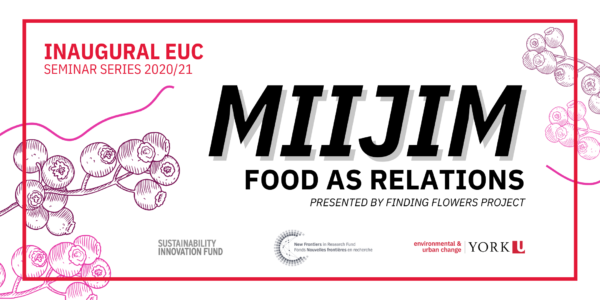TORONTO, Sept. 30, 2020 – A new seminar series by York University – Miijim: Food as Relations – is a conversation with renowned Indigenous, Black and People of Colour food scholars, growers, artists and advocates.
“Miijim” is an anishinaabemowin word that translates loosely to food. Discussions will cover the interconnections between art, earthwork, planting, cultivation and harvesting experiences that decenter colonial frameworks, while thinking through labour and power relations related to food justice in urban and rural communities.
The series will run in the fall and winter terms with presenters gathering virtually from across Canada. The Finding Flowers Project, with co-principal investigator Assistant Professor Lisa Myers, will present this inaugural Faculty of Environmental and Urban Change seminar series as part of the graduate class “Food, Land and Culture.”

“These conversations bring together people who do important work with food and medicine plants across communities,” says Myers. “They have offered so much to how I understand miijim, and I am struck by their generosity to be in conversation and to share their work for our seminar series.”
The fall segment will feature conversations on Indigenous food sovereignty; Black and Indigenous food relations; Anishinaabe and Haudenosaunee food systems; learning from “manoomin” (wild rice); and art and migrant worker justice. Conversations will continue into the winter semester turning to art related themes, including animal-plant-human relations; food and gardens as remediation; gardens as art as relations; and community food stories.
The series will begin on Oct. 6 and run from 2:30 to 4:30 pm, presenting a conversation on Indigenous Food Sovereignties. The conversation will bring together Secwepemc artist, curator and co-creator of Bush Gallery, Tania Willard, in conversation with Secwepemc Dawn Morrison, founder and curator of the Working Group on Indigenous Food Sovereignty, and Mi’kmaw professor and Indigenous land and food justice advocate Sherry Pictou. The presenters will consider their work in defence of Indigenous sovereignties, in relation to the reclamation of land, medicines, foods and plants.
This conversation, and all future ones, will be held on Zoom and live-streamed through Facebook. Register on Eventbrite for the zoom link: https://miijimfoodasrelations.eventbrite.com
MIIJIM conversation series fall 2020:
October 6
Indigenous Food Sovereignties
This conversation will bring together Secwepemc artist, curator and co-creator of Bush Gallery Tania Willard in conversation with Secwepemc Dawn Morrison, Secwepemc founder and curator of the Working Group on Indigenous Food Sovereignty, and Mi’kmaw professor and Indigenous land and food justice advocate Sherry Pictou, to consider their work in defense of Indigenous sovereignties, in relation to the reclamation of land, medicines, foods and plants.
October 20
Black and Indigenous Foods in Relation
This conversation opens up the decades of work by Cree scholar Professor Priscilla Settee in Indigenous Food Sovereignty with Leticia Ama Deawuo’s work at Black Creek Community Farm and her personal research on food history connecting with her grandmother and African/Indigenous foods.
October 27
Learning from Manoomin (Wild Rice)
Bringing together James Whetung from Curve Lake First Nation and Jana-Rae Yerxa from Couchiching First Nation to discuss manoomin cultivation and harvesting in relation to Anishinaabe food systems, governance and the reclamation of land and waters.
November 10
Haudenosaunee & Anishinaabe Food Systems
Considering that food systems are specific to cultures, nations and territories, this conversation brings together medicine and food scholars Joe Pitawanakwat from Wikwemikong First Nation, William Kingfisher from Rama First Nation and Chandra Maracle from Six Nations of the Grand River, to consider this specificity and to add nuance and complexity to the potentially flattening term “Indigenous food system.”
November 24
Migrant Workers and Food Justice
This conversation is grounded in artistic practices that raise important considerations of labour and living conditions of those workers who grow the food that fills the grocery stores. We will bring together activist and advocate Evelyn Encalada, and Justice 4 Migrant Workers member Tzazna Maranda to consider their calls to action through art and activism.
-30-
York University champions new ways of thinking that drive teaching and research excellence. Our students receive the education they need to create big ideas that make an impact on the world. Meaningful and sometimes unexpected careers result from cross-disciplinary programming, innovative course design and diverse experiential learning opportunities. York students and graduates push limits, achieve goals and find solutions to the world’s most pressing social challenges, empowered by a strong community that opens minds. York U is an internationally recognized research university – our 11 faculties and 25 research centres have partnerships with 200+ leading universities worldwide. Located in Toronto, York is the third largest university in Canada, with a strong community of 53,000 students, 7,000 faculty and administrative staff, and more than 300,000 alumni. York U's fully bilingual Glendon Campus is home to Southern Ontario's Centre of Excellence for French Language and Bilingual Postsecondary Education.
Media Contact:
Sandra McLean, York University Media Relations, 416-272-6317, sandramc@yorku.ca

